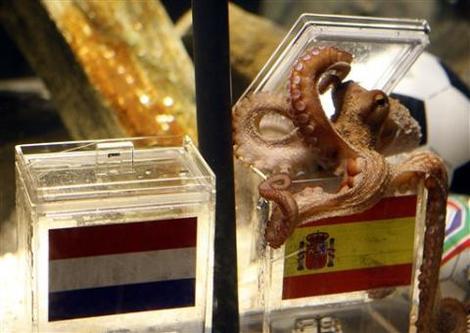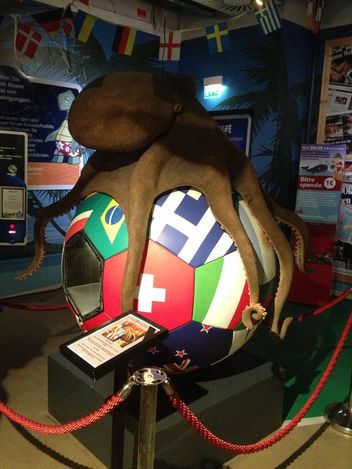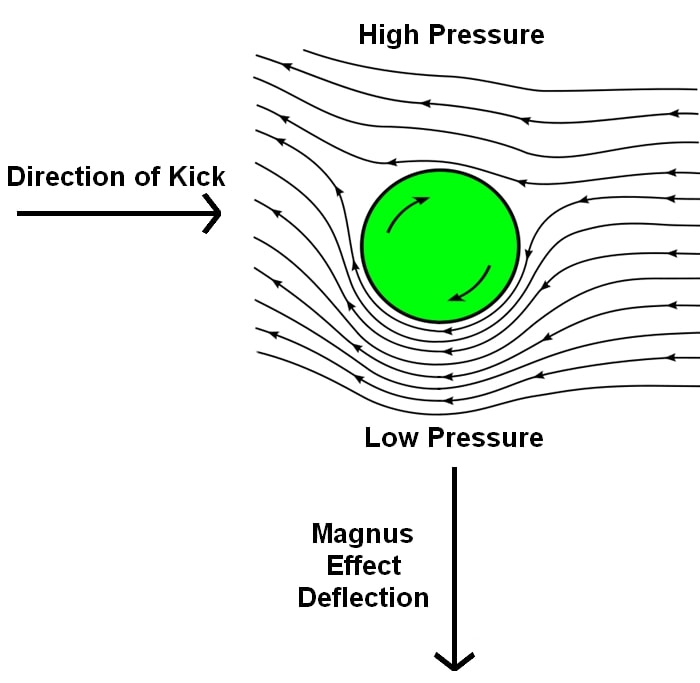|
Most of the discussion at the World Cup was about the games, the players, the teams, and the countries, but there are few comments about the entity that made it all possible. I am talking, of course, about the ball. For example, the design of the soccer ball is a highly technical endeavor that can dramatically affect the outcome of games depending on whether particular aspects of the way the ball travels when it’s kicked align better with a team’s style of play. Over the years many soccer balls have been designed for World Cup competitions with each type of ball having its defenders and detractors. However, for this post I want to concentrate on some particular spin effects that soccer balls can exhibit that are exploited by players, or that have led to occurrences that have forever been recorded in soccer lore. When the ball hits an obstacle it may acquire a spin. This fact has sometimes led to curious situations where a premature celebration of a penalty that was missed as a result of the ball hitting the goalpost or being deflected by the goalkeeper, ended in disaster when the ball made its way into the goal as a result of a forward spin. However, the most remarkable of these situations happens when the ball hits the underside of the upper beam of the goalpost acquiring a backward spin. If the ball hits the beam at just the right angle it will bounce down towards the goal line and then away from the goal. This occurrence has been responsible for some of the controversial goals (or non-goals) which have been dubbed “ghost goals”. One of the most famous ghost goals in history was scored by the British player Geoff Hurst during the World Cup final against Germany in 1966. German and British fans have not stopped arguing about whether this was a goal or not, and the Germans still think they were robbed of a chance at winning the World Cup. However, sweet revenge came to the German side in 2010 when in a World Cup match a goal eerily similar to Hurst’ 1966 goal was scored by Frank Lampard for the British side. Whereas the television cameras revealed that a goal had indeed been scored, the main referee and the linesman did not see the ball bounce inside the goal and did not call it. Britain eventually lost the game and its chance at winning the World Cup. As a result of this goal and other similar events the world’s soccer governing body, FIFA (International Federation of Association Football) has adopted a series of technological advances including goal line technology, which has made ghost goals a thing of the past, at least at the world cup level. The most impressive spin effects on soccer balls do not occur by happenstance. Imparting a spin on the ball when it is kicked, is an action taken by players to bypass a blockade from the other team, to fool the goalie, or to place the path of the ball towards the goal beyond the goalie’s reach. In doing so, the soccer players are exploiting a very well-known scientific principle called the Magnus effect, named after the German scientist Gustav Magnus who studied it. One way to explain the Magnus effect is to imagine that the soccer ball, as it travels spinning through the air after being kicked, possesses a thin layer of air that spins with it. On the side of the ball that is spinning in the direction of the movement of the ball, the molecules of this thin layer of air collide against the molecules of air blowing past the ball, and slow them down, creating an area of high air density and therefore high pressure. However, on the opposite side (the side of the ball spinning in the direction opposite to the movement of the ball) the air molecules in the thin layer collide with the air molecules blowing past the ball and speed them up creating an area of less air density and therefore low pressure. This pressure gradient creates a force that deflects the ball sideways in the direction of the spin. Some particularly spectacular applications of the Magnus effect involve free kicks. In the slow motion replays of the kicks below you can clearly see the ball curving through the air on its way to a smashing goal! But perhaps the greatest application of the Magnus effect involves the so-called “Olympic Goals” which are goals scored from corner kicks. These goals are not very common because of the difficulty of the angle, and the fact that goalkeepers and players usually take positions in front of the goal to defend against these kicks, but when they are scored they are an amazing sight to behold. Many players have mastered the art of spinning the ball in the right way to score goals that have become the stuff of legend, and names like Roberto Carlos, Beckham, Ronaldinho, Messi, Ronaldo, Maradona, Platini, and others have thrilled or are still thrilling generations of soccer fans. There are other issues regarding soccer balls that I have not touched in this post including the transition of air flow over the surface of the ball from turbulent to laminar after a kick, or the way the grooves of the ball and the roughness of the ball’s surface can affect its behavior. But I hope that from reading this post you have gained an appreciation for the lore and science behind the spin! Image by Gang65 modified and used here under an Attribution-Share Alike 3.0 Unported license.
0 Comments
 Excitement was in the air as the world was once again struck with World Cup fever, and the teams from 32 nations competed in Russia to decide who would be the world soccer champion. In the final France defeated Croatia to claim the title for the second time. However, rather than write about the science behind soccer, today I want to revisit the exploits of Paul, an unassuming octopus who dwelled in a tank at the Sea Life Center in Oberhausen, Germany, and who correctly predicted the outcome of 8 consecutive World Cup games back in 2010.  It all started during the 2008 matches for the European Soccer Cup. In what was a publicity stunt for the aquarium, Paul's keepers began introducing into his tank 2 plastic boxes each containing a tasty mussel. The boxes with lids that the octopus could open had the flag of the German team on one of them and the flag of the opposing team on the other. The idea was that the box that Paul opened first would be the winner of the game. Thus, during the European Cup Paul predicted that the German team would win all of its 6 games but got 2 of the results wrong when the German team was defeated by Croatia in the group phase and by Spain in the final. As it turns out, Paul was just honing his divination skills. Two years later, during the group phase of the World Cup the cephalopod correctly predicted that Germany would defeat Australia and Ghana, and lose against Serbia, but still he remained a local phenomenon. It was during the round of 16 games when Paul predicted that Germany would defeat England that he began to receive international attention, and then everyone went wild when the octopus correctly predicted that Germany would defeat Argentina in the quarter finals. Paul's divinations began to be transmitted live throughout Germany and to other countries, and pundits for and against the mollusk expounded their views in electronic and printed media. Paul became a superstar, a media sensation with his own Twitter and Facebook fan pages. The German soccer fans sensed that the mysterious forces that Paul channeled were on their side. Would Germany win the World Cup? Unfortunately it was not to be, Paul was an honest soothsayer and he called them like he saw them. For the next game he chose Spain as the winner. Gloom and doom washed over the German fans. The German players were shocked to learn the news: the cephalopod's "vibes" were no longer on their side. How could THEIR octopus do this to them? On the eve of the game they all prayed and many took solace that Paul had been wrong before, but to no avail, Spain defeated Germany in the semifinal. Angry fans flooded the German media with their favorite octopus recipes. Articles were printed labeling Paul a "traitor". The aquarium received threats and Paul's security detail had to be doubled. Spaniards on the other hand were delighted that the oracle was on their side. The Spanish president announced that he was considering sending a team of bodyguards to protect Paul, and Spain's environment minister promised to grant Paul the condition of an endangered species so Germans would not eat him. Paul redeemed himself a bit by correctly predicting that Germany would defeat Uruguay in the game for third and fourth place. His handlers then for the first time asked the tentacled wonder to predict the outcome of a game where Germany did not play: the final between Spain and the Netherlands. In his final World Cup prediction, the mollusk chose Spain. This was significant as half a world away in Singapore another psychic animal wonder (albeit with a spottier track record), a parrot named "Mani", picked the Netherlands to win. So that fateful final game of the 2010 World Cup was not just the Netherlands vs. Spain, it was also a clash between the two psychic titans, the parrot vs. the octopus, and it was the invertebrate that prevailed. Despite many hefty monetary offers to the aquarium to have Paul expand his soothsaying abilities to things like the economy as well as requests that Paul be present at different events to honor him, his handlers declared that the mollusk would retire from the divination business and would live the rest of his life making children happy at the Oberhausen Sea Life Center. Alas, as it turns out Paul’s days were numbered. He died later that year in October, and a memorial to Paul was erected at the Sea Life Center in Oberhausen. However, besides all the fun and games some people have been left wondering whether Paul was for real. Was there something to his soothsayer abilities? Did Paul have hidden powers? Was he a psychic? This question is not as silly as it looks. By the time Paul started getting noticed there were individuals who were betting on World Cup games based on his predictions. People "out there" believe the darnedest things, and I am sure that Paul's feat convinced many of his fans that there was something going on with this octopus beyond mere chance. So let's put Paul's performance into perspective. First of all, the chances of getting the outcome of 8 consecutive games right is 1/256. This is the same as the probability of tossing a coin 8 times and obtaining heads every time. Although this is not a very probable event it is within the realm of the possible. Paul was not operating against a million to one odds here. One way to look at these odds is that if 256 people tossed a coin 8 times, at least one would succeed in obtaining heads eight times. If you consider that there were a billion plus people throughout the world watching the World Cup and trying to guess the outcome, you can calculate that 4 million people or so probably guessed the outcome of 8 games in a row correctly. However, none of them had the tentacles to become a media sensation. The other issue to consider is possible sources of biases in the divination procedure itself. Although octopuses like Paul do not have color vision they do perceive light and dark contrasts, and notice shapes including horizontal lines or bars. So, one possibility is that the flag design on one of the boxes attracted the mollusk's attention more than another. If Paul was attracted to the German flag design this could have biased his choice in favor of Germany, which he predicted to win 5 out of 7 times. The box location is another possible source of bias. In 6 out of 7 of Paul's divination trials the location of the box he chose was the one on the right (the information about the position of the box is lacking for one of the games). This is important because in 4 out of 6 of his predictions the box with the German flag was also the one on the right. Did Paul predict accurately or did he have a bias for the box on the right and the flag of whoever won happened to be there? Other possible sources of bias include whether any scent or food smears were stronger in one box vs. the other, or even whether the performance of some superstitious players could have been influenced, positively or negatively, when they learned about Paul's choice. The elimination of sources of bias is a common procedure in the scientific test of the abilities of psychics and so far in the history of scientific psychic testing, when all the biases are accounted for, not a single psychic has been able to perform above chance. Thus, if Paul's handlers had been interested in asking the question of whether Paul was for real, they could have concealed the flags, made sure the flags were randomly assigned to a given box, made sure there were no scent or food smears cues in either box, or even revealed Paul's choice after the game to make sure no superstitious players were influenced. But the handlers were not interested in doing this because their intention was not to ask whether Paul really had psychic abilities. They just wanted to attract attention, raise money for the aquarium, and have a good time. And in this they succeeded beyond their wildest dreams. Others were not so fortunate. For example the Chemnitz zoo also in Germany tried its luck at the divination business with Leon the porcupine, Petty the pygmy hippo, and Anton the tamarin, but each of these animals struck out in the group phase of the World Cup picking the wrong team to win. So let's all have a good laugh remembering the exploits of "The Oracle of Oberhausen" and not take things too seriously and, oh yes, enjoy a nice seafood dish every now and then. The picture of Paul from "Voice of America" is in the public domain. The picture of Paul's memorial by Christophe95 is used here under an Attribution-Share Alike 3.0 Unported license. |
Details
Categories
All
Archives
June 2024
|

 RSS Feed
RSS Feed